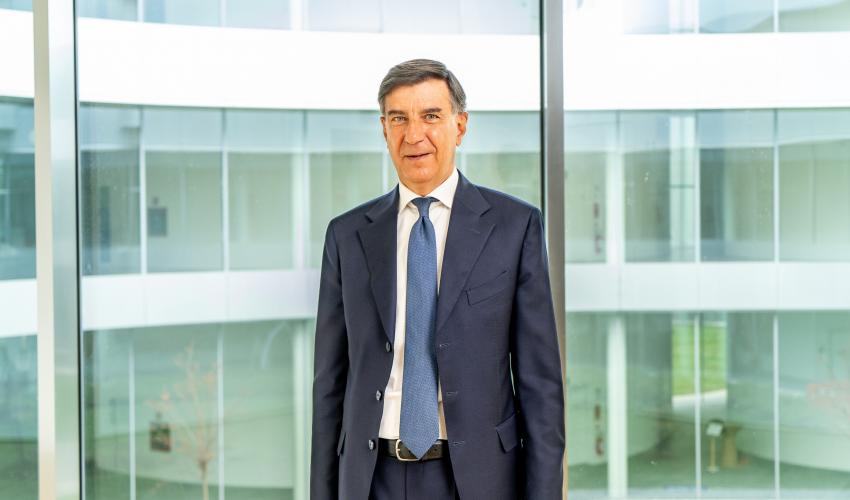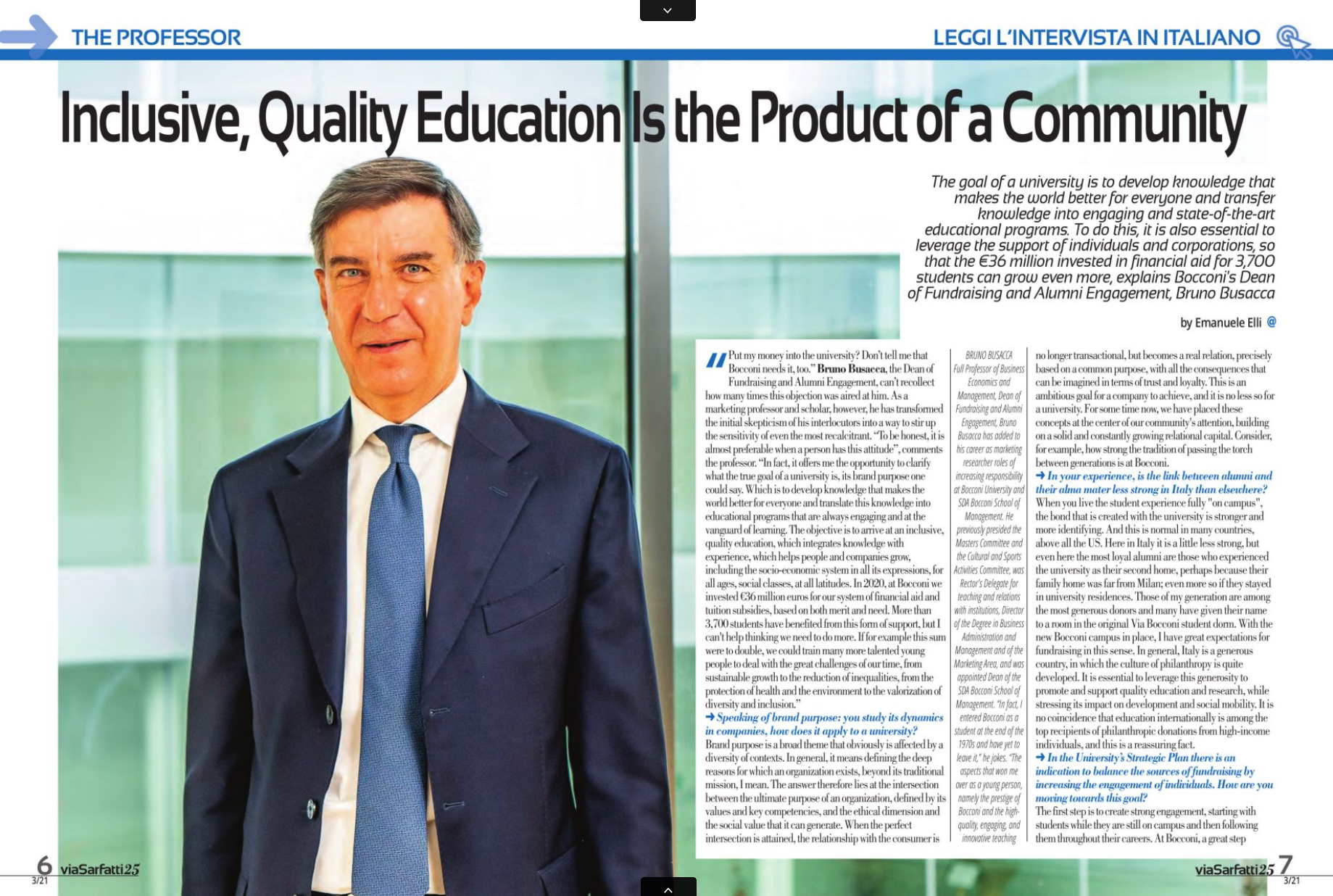
Inclusive, Quality Education Is the Product of a Community
THE GOAL OF A UNIVERSITY IS TO DEVELOP KNOWLEDGE THAT MAKES THE WORLD BETTER FOR EVERYONE AND TRANSFER KNOWLEDGE INTO ENGAGING AND STATEOFTHEART EDUCATIONAL PROGRAMS. TO DO THIS, IT IS ALSO ESSENTIAL TO LEVERAGE THE SUPPORT OF INDIVIDUALS AND CORPORATIONS, SO THAT THE EUROS 36 MILLION INVESTED IN FINANCIAL AID FOR 3,700 STUDENTS CAN GROW EVEN MORE, EXPLAINS BOCCONI'S DEAN OF FUNDRAISING AND ALUMNI ENGAGEMENT, BRUNO BUSACCA"Put my money into the university? Don't tell me that Bocconi needs it!". Bruno Busacca, the Dean in charge of fundraising and relations with alumni, can’t recollect how many times this objection was aired at him. As a marketing professor and scholar, however, he has transformed the initial skepticism of his interlocutors into a way to stir up the sensitivity of even the most recalcitrant. "To be honest, it is almost preferable when a person has this attitude", comments the professor, who, before taking up his current role, was also a Bocconi student, researcher, degree program director, professor and Dean of SDA Bocconi School of Management. "In fact, it offers me the opportunity to clarify what the true goal of a university is, its brand purpose one could say. Which is to develop knowledge that makes the world better for everyone and translate this knowledge into educational programs that are always engaging and at the vanguard of learning. The objective is to arrive at an inclusive, quality education, which integrates knowledge with experience, which helps people and companies grow, including the socio-economic system in all its expressions, for all ages, social classes, at all latitudes. In 2020, at Bocconi we invested €36 million euros for our system of financial aid and tuition subsidies, based on both merit and need. More than 3,700 students have benefited from this form of support, but I can't help thinking we need to do more. If for example this sum were to double, we could train many more talented young people to deal with the great challenges of our time, from sustainable growth to the reduction of inequalities, from the protection of health and the environment to the valorization of diversity and inclusion.”
Speaking of brand purpose: you study its dynamics in companies, how does it apply to a university?
Brand purpose is a broad theme that obviously is affected by a diversity of contexts. In general, it means defining the deep reasons for which an organization exists, beyond its traditional mission, I mean. The answer therefore lies at the intersection between the ultimate purpose of an organization, defined by its values ​​and key competencies, and the ethical dimension and the social value that it can generate. When the perfect intersection is attained, the relationship with the consumer is no longer transactional, but becomes a real relation, precisely based on a common purpose, with all the consequences that can be imagined in terms of trust and loyalty. This is an ambitious goal for a company to achieve, and it is no less so for a university. For some time now, we have placed these concepts at the center of our community's attention, building on a solid and constantly growing relational capital. Consider, for example, how strong the tradition of passing the torch between generations is at Bocconi.
In your experience, is the link between alumni and their alma mater less strong in Italy than elsewhere?
When you live the student experience fully "on campus", the bond that is created with the university is stronger and more identifying. And this is normal in many countries, above all the US. Here in Italy it is a little less strong, but even here the most loyal alumni are those who experienced the university as their second home, perhaps because their family home was far from Milan; even more so if they stayed in university residences. Those of my generation are among the most generous donors and many have given their name to a room in the original Via Bocconi student dorm. With the new Bocconi campus in place, I have great expectations for fundraising in this sense. In general, Italy is a generous country, in which the culture of philanthropy is quite developed. It is essential to leverage this generosity to promote and support quality education and research, while stressing its impact on development and social mobility. It is no coincidence that internationally education is among the top recipients of philanthropic donations from high-income individuals, and this is a reassuring fact.
In the University’s Strategic Plan there is an indication to balance the sources of fundraising, which is currently somewhat skewed towards companies, by increasing the engagement of individuals. How are you moving towards this goal?
The first step is to create strong engagement, starting with students while they are still on campus and then following them throughout their careers. At Bocconi, a great step forward was made by uniting all the alumni associations into a single community. With the latest reform, in 2018, the Bocconi Alumni Community was born which, for the first time, abolished the payment of the membership fee. It no longer felt appropriate in current times: if you studied at Bocconi, you don't need to pay a fee to be part of our community. This change has paid off, because in three years members have more than trebled and today the alumni community is over 30,000 strong. The initiatives organized for alums go in various directions: Life-Long Learning, in close coordination with SDA Bocconi and with the active involvement of the various topic leaders; Career Advice and initiatives to support professional careers; the classic Class Reunions, usually accompanied by ad hoc fundraising drives. To build a climate of engagement, we try to foster a two-way relationship between people and the university, where each one gives and receives. With our alumni, we seek to leverage the three "Ts", by asking them to make their Talent available, for example by becoming mentors and tutors of students, devote their own Time, by welcoming students and researchers in companies or bringing their own experience to master and executive courses, and of course give some of their Treasure, by providing tangible support to our various causes.
What are the initiatives that are most appreciated by companies?
The issue which companies and foundations are most sensitive about is being able to link their names to the development of academic knowledge and human capital, in order to contribute to the progress of the whole world. For this reason, at Bocconi we offer the possibility of creating chairs and multi-year research projects supported by corporate donors. Today we have twenty titled professorships and the number of research laboratories that can count on charitable contributions to explore the central research issues for the economy and society continues to grow. There are also other forms of help, including the possibility of improving the life of the Bocconi community by promoting the quality and sustainability of campus environment and equipment, an option that can result in the naming of classrooms and other spaces. And then there are scholarships, which help us to support and spread the value of education for social mobility and to promote the new Bachelor or Master of Science programs, on innovative topics such as cybersecurity and artificial intelligence. Speaking of scholarships, I would like to mention the one we just stipulated to honor the memory of Luca Attanasio, our graduate and Italian ambassador to Congo, killed in an attack in February, which received incredible support. Thanks to the response of the Bocconi Alumni Community and the University's willingness to match the amount raised, we will be able to establish five new scholarships, a result that makes us particularly happy, because increasing the number of graduates in Italy is an absolute priority. There is still a long way to go, but certainly a decisive step has been made to open the doors of higher education to young talents coming from disadvantaged backgrounds, who, without help, would inevitably stray from the goal of college education.
SHORT BIO
Professor of Business Economics and Management, Dean for Fundraising and Alumni Engagement, Bruno Busacca has added to his career as marketing researcher roles of increasing responsibility at Bocconi University and SDA Bocconi School of Management. He previously presided the Masters Committee and of the Cultural and Sports Activities Committee, was Rector’s Delegate for teaching and relations with institutions, Director the Degree in Business Administration and Management and of the Marketing Area, and was appointed Dean of the SDA Bocconi School of Management. “In fact, I entered Bocconi as a student at the end of the 1970s and have yet to leave it,” he jokes. "The aspects that won me over as a young person, namely the prestige of Bocconi and the high-quality, engaging, and innovative teaching methods it offered, like teamwork and case studies, which were the envy of all my friends enrolled in other universities, have strengthened and still remain the distinctive features of our University. Becoming Dean of SDA Bocconi was really an important milestone and a fundamental step to strengthen my sense of belonging to a larger community that today I am called to safeguard and disseminate in my role as Dean of Development".
Read here 10 stories of Alumni and Companies that have chosen to support Bocconi University
Read the interview with Bruno Busacca and the 10 stories of Bocconi Donors in the magazine viaSarfatti25

by Emanuele Elli
Translated by Alex Foti
